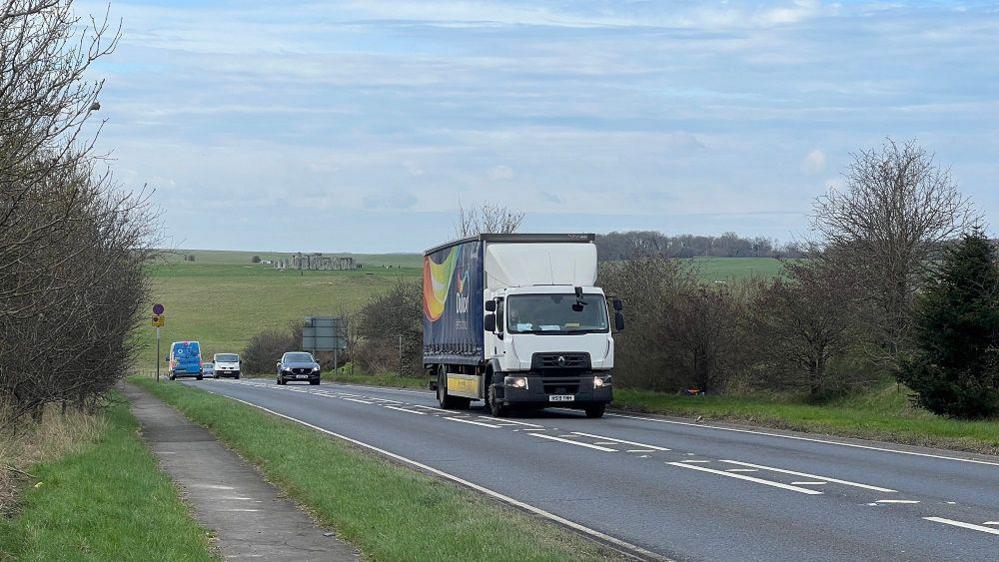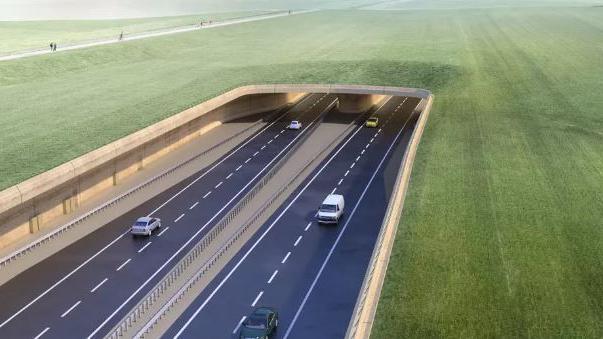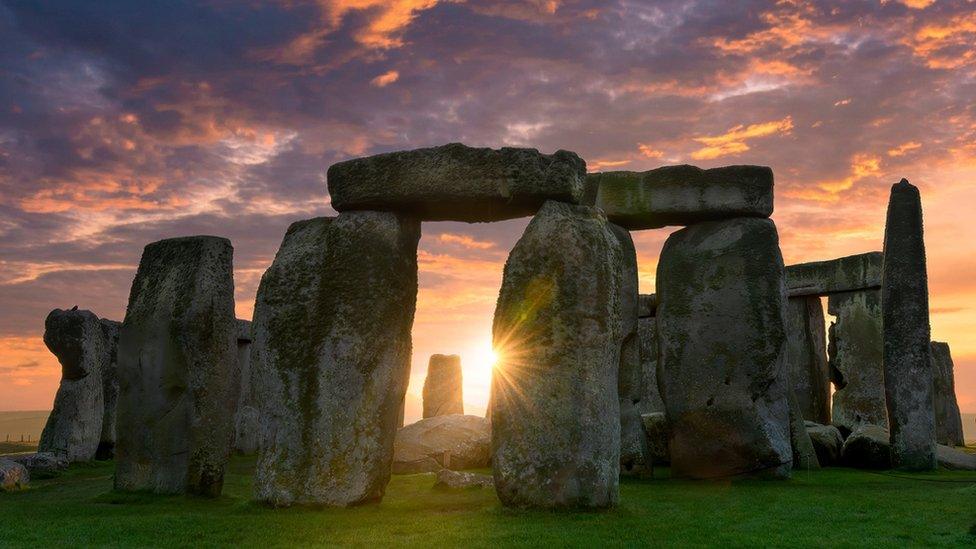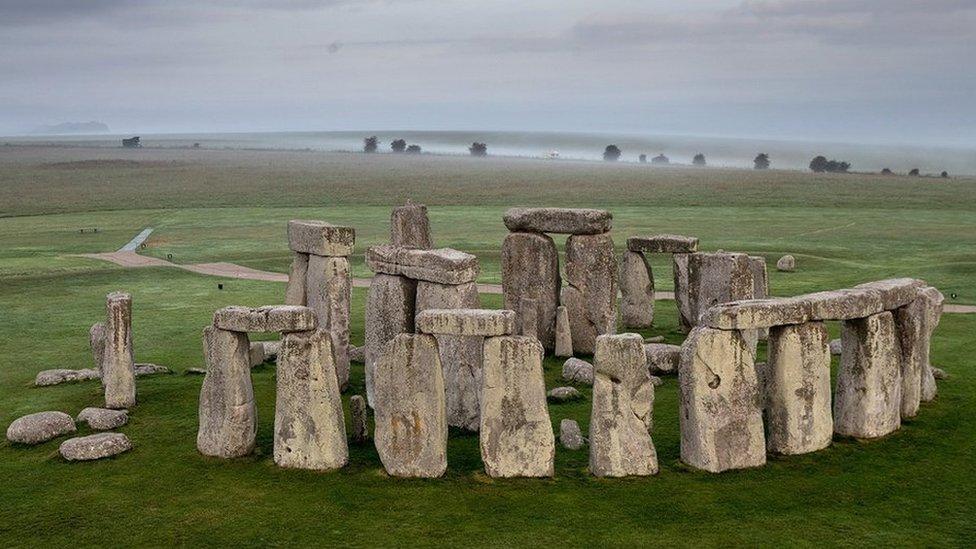Campaigners raise more than £15k for tunnel appeal

The A303 past Stonehenge is currently not dualled, causing bottlenecks, including when people slow down to catch a glimpse of the ancient monument
- Published
Campaigners against the building of a tunnel past Stonehenge said they have already raised £15,000 to appeal the latest high court decision.
Save Stonehenge World Heritage Site (SSWHS) lost it's most recent legal battle to prevent a tunnel to house the busy road, but won its previous one.
John Adams - one of the group's directors - explained they are determined to appeal: "We're going to oppose it for as long as we possibly can."
National Highways said a tunnel will remove the sight and sound of traffic passing the site and cut journey times.

John Adams is part of the Save Stonehenge World Heritage Site group, which has been launching the legal challenges to the tunnel
In December, campaigners brought a second bid to the High Court in London to challenge the decision to reapprove the plans, which will overhaul eight miles (12km) of the A303, including building a 1.2 mile (2km) tunnel.
Mr Adams called the decision a "set back", but also said "the process has not been exhausted yet".
Each time campaigners go through the legal route to try and stop the current plans from National Highways and the government, they have to raise a huge amount of money.
For the first two cases, they raised £80,000 each time. If they are given permission to appeal, they will need £40,000 on top of the £15,000.
However, they have not lacked in financial support, including from around the world: "Occasionally we'll get £1,000 or £2,000, and in December, just before the High Court hearing we had a single donation of £8,000."
Mr Adams added that their petition now has more than 230,000 names from more than 147 countries.
He explained: "It's a tiny organisation, but we're optimistic and we have to be. We think it's the wrong scheme. We should be protecting this world heritage site for future generations."
The group mentions that world heritage body Unesco has criticised the plans, saying that if there is a tunnel, it should stretch underneath the whole World Heritage site, to avoid any damage to archaeology.
The other argument it uses is that planning inspectors have also not recommended the scheme.

Andy Shuttleworth is from Winterbourne Stoke and also part of the Stonehenge Traffic Action Group
However, for all the opposition, there is just as much relief from many. There are split opinions locally, but for those living along the A303 or in villages that become "rat-runs" when it closes because of accidents, a solution to the traffic problem is wanted.
Winterbourne Stoke is cut in two by the current road and the tunnel would not stretch that far, but it would provide it with a bypass.
Andy Shuttleworth is from the village and a founding member of the Stonehenge Traffic Action Group (STAG) - he said: "We've had children injured in the past, we have cars regularly hit. Every weekend, we have a stream of police, fire, ambulance vehicles sorting out crashes along this stretch of the A303.
"All that will go away. We've got a solution being offered," he added.
English Heritage, which runs the Stonehenge site, the National Trust, which owns much of the World Heritage landscape around it and Historic England are in support of the scheme, partly because it would bury the road with the aim of uniting the landscape.

Indra Donfrancesco has environmental concerns about the tunnel plan
There is another side to the opposition aside from heritage - the carbon impact.
This was also taken to the High Court, but a decision has not yet come through.
Indra Donfrancesco was part of a protestors camp next to the A303 at Amesbury for a while, which focused on the environment.
She explained their emphasis was on how much more change there would be aside from the tunnel.
"We had a campaign a few years ago under the banner 'Not just a tunnel'. The ecology around the entire build is at risk and not being talked about much in the mainstream. There is another eight miles of devastation."
Ms Donfrancesco added: "I don't think people are ready for this. I think it's going to be a massive shock when people realise actually what's going to happen during the building works.
"The massive drainage ditches, the pollution, the offspill from all the vehicles, the dust, the ecology that will be disturbed. The birds, the bats, the watercourses."

The National Highways plan is to put in a tunnel past Stonehenge, along with other road changes around it
In terms of the government, the cost of the scheme has increased to £2.5bn. Transport secretary Mark Harper said their position "was very clear", but there is still the legal challenge over the carbon impact of the project.
David Bullock from National Highways said the latest High Court judgement marked a "huge step forward in terms of delivering this project for us that has been decades in the making".
If the environmental legal hurdle is cleared, National Highways expected construction of the tunnel to begin in 2025.
Follow BBC Wiltshire on Facebook, external, X, external and Instagram, external. Send your story ideas to us on email, external or via WhatsApp on 0800 313 4630.
See Also
- Published19 February 2024

- Published20 February 2024
